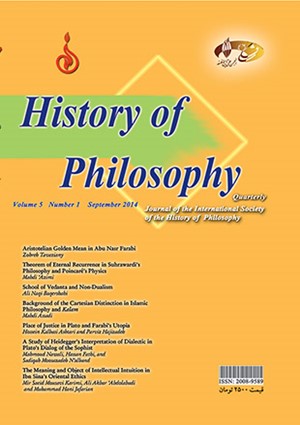-
-
List of Articles
-
Open Access Article
1 - سخن سردبير
Hossein Kalbasi Ashtari -
Open Access Article
2 - Aristotelian Golden Mean in Abu Nasr Farabi
Zohreh Tavaziany -
Open Access Article
3 - Theorem of Eternal Recurrence in Suhrawardi’s Philosophy and Poincaré’s Physics
Mehdi ‘Azimi -
Open Access Article
4 - School of Vedanta and Non-Dualism
Ali Naqi Baqershahi -
Open Access Article
5 - Background of the Cartesian Distinction in Islamic Philosophy and Kalam
Mahdi Assadi -
Open Access Article
6 - Place of Justice in Plato and Farabi’s Utopia
Hossein Kalbasi Ashtari Parviz Hajizadeh -
Open Access Article
7 - A Study of Heidegger’s Interpretation of Dialectic in Plato’s Dialog of the Sophist
Sadiqah Moosazadeh N‘alband -
Open Access Article
8 - The Meaning and Object of Intellectual Intuition in Ibn Sina’s Oriental Ethics
Mir Saeid Mousavi Karimi Ali Akbar ‘Abdolabadi Muhammad Hani Jafarian
-
The rights to this website are owned by the Raimag Press Management System.
Copyright © 2017-2026







